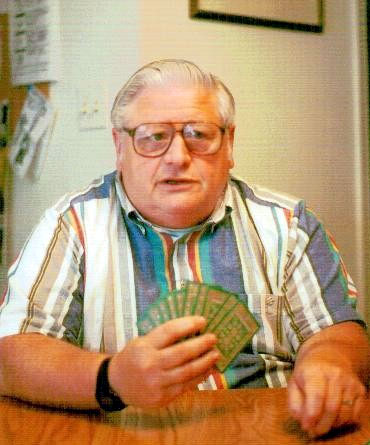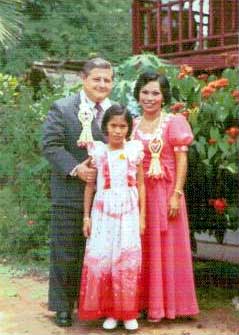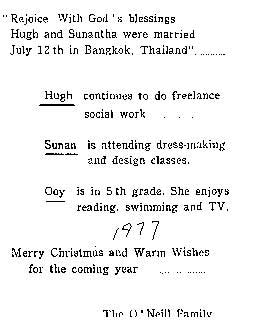1936-1998

This message from Hugh O’Neill appeared in Issue Number 46 (January 1988) of the Turkey 9 Newsletter:
Gee, it’s been a long time since I last communicated directly with you. Not remembering when we were last in touch, let me start by saying I’m married (Sunantha) and we have a daughter (Phontipha). Following the Peace Corps, I accepted employment with USAID. During my eight years in South Vietnam I was classified as a Special Welfare Advisor with responsibilities for nationwide planning and the implementation of family and child welfare services. During a part of my tour of service, based on USAID sponsored training in nutrition and population at Columbia University Medical School, I assisted in the design and implementation of a PL 480 nutrition program for more than 200,000 refugees and 1000 child care centers. In 1972, following USAID sponsored training at the Maxwell School of International Development, Syracuse University, I was Deputy Senior Advisor in Darlac Province, an assignment which gave me additional familiarization with management and personnel matters. Following the expiration of my time-limited appointment with USAID, I continued to work in the social services field holding such positions as Country Representative for an international voluntary agency and Consultant for family and child services to work for the Government of Thailand and UNICEF. Based on my professional work I have been awarded the National Defense Medal of Honor from the Government of Thailand. I presently work at the City of Philadelphia orphanage (Girard College) with 20 fourth and fifth grade boys and girls. When time permits, I “toy” with drafting a doctoral paper on social welfare administration. Never giving up the dream, I continually search for professional leads that may land me back in southeast Asia.
Looks like Sunantha and I will have to pass up this year’s proposed “Middle East Paradise Adventure.” In celebration of my 50th birthday we are already making arrangements to spend the entire month of July in Thailand. In addition to just enjoying ourselves, we really need to make the trip to tend to family business (Sunantha is still a Thai citizen). Perhaps at another time we can join a group going to “Paradise”. If anyone gets to the Philadelphia area, the welcome mat is out. . . . Selamlar!


Front and back side of a combined Christmas card (1977) and wedding announcement of Hugh O’Neill (Turkey IX) and his bride, Sunan, and her daughter Ooy.
Hugh O’Neill by Sandy Pfunder (T-9)
Perhaps the most memorable evening I spent in Turkey was with my site partner, Allen, and fellow Turkey IX volunteer, Hugh O’Neill. Hugh had been my roommate during training in Portland. He was about eight years older than I and had been a professional social worker before entering the Peace Corps. He was an extraordinarily funny man with an infectious laugh. He also had a sharp tongue and did not suffer fools gladly. His use of the Turkish language was creative and colorful, but disconnected and utterly ungrammatical. He said he took pride in having been officially certified as incapable of learning a foreign language.
I only dimly understood Hugh’s official assignment. He taught social work in some government organization in Ankara. Much more fun, he chose to live in a gece kondu neighborhood called Çin Çin. Allen and I were in Ankara for some official reason in early May of 1966 and we met him at the end of his work day. We boarded a city bus and rode together for about 45 minutes into the hills outside the city. From the bus stop we walked through a neighborhood of small, flat roofed mud brick houses separated by unpaved streets. Hugh’s house was like the others; it had a bedroom and a living room, with straw mats on the floors. He had electricity and running water.
We sat around and had a leisurely conversation while Hugh cooked dinner. We had just finished eating when there was a loud knock on his door and a high pitched call, “Hoo Yoo!” Hugh explained that the Turks had some difficulty pronouncing his name. A bevy of village ladies entered the house and made shooing signs to Hugh, our first indication of his fundamental skill in using and cultivating non-verbal communication. Hugh turned to us with a twinkle in his eye. “We have to take a walk,” he said.
So we walked out into the neighborhood. Hugh showed us three apple trees that he had recently planted. Each was about eight feet tall, about two inches in diameter, with a couple of spindly branches and about twelve leaves. He said that they had been difficult to plant, since he had to borrow a pick axe to break through the hard packed earth. He recounted that one of his neighbors had asked him why he was working so hard to plant trees, and he had explained that he liked shade. During the next half hour of our meandering through the neighborhood, Hugh expressed surprise at finding two more newly planted trees that he said had not been there the previous week. I remember his saying: “What more could I ask?”
We talked with a number of his neighbors that we met on the street. They were articulate and interesting. They had all come from villages, seeking better education and better job opportunities. They explained the practice of helping newcomers to find or build shelter. They viewed themselves as a community, and they took pride in their neighborhood. Their conversation suggested that they were highly motivated and upwardly mobile. To the extent that Allen and I had had our own images of the gece kondu prior to that evening, they bore no resemblance to what we found.
When we returned to Hugh’s house, our dinner dishes had been washed, and a basket of clean laundry had been exchanged for whatever the ladies had found that looked as though it needed washing. The neighbors clearly were very fond of this guy and took good care of him.
We sat down to chat, and there was another knock at the door. This time two school-age kids came into the living room. It was time for the weekly sign-in and sign-out of library books. Hugh explained that he had bought a collection of Turkish books for the neighborhood kids but insisted that they devise and administer their own system to keep track of the books. He said they all agreed that it was necessary to number the 75 or so books, so each one was given an individual number, ranging from one to about 30,000.
Hugh told us that one time one of the books had been stolen, and the kids asked Hugh what he was going to do about it? Hugh told them that he wasn’t going to do anything. It was their library. It was their problem. A few days later, a sheepish young man knocked at Hugh’s door and gave him the 30 kurus that he said he had made reselling the stolen book.
When the “library” was ready for business, a couple of dozen kids who had waited outside were admitted to the living room. Incoming and outgoing books were duly logged, and then everybody left.
We had time for a bit more conversation before Hugh walked with us back to the bus stop, where Allen and I caught the bus back into town. We were quite sure that we had seen a master at work that evening.
P.S. I saw Hugh a number of times after Peace Corps. He always had something fun and funny to say. . Hugh died in 1998.
Sandy Pfunder (Turkey IX)
